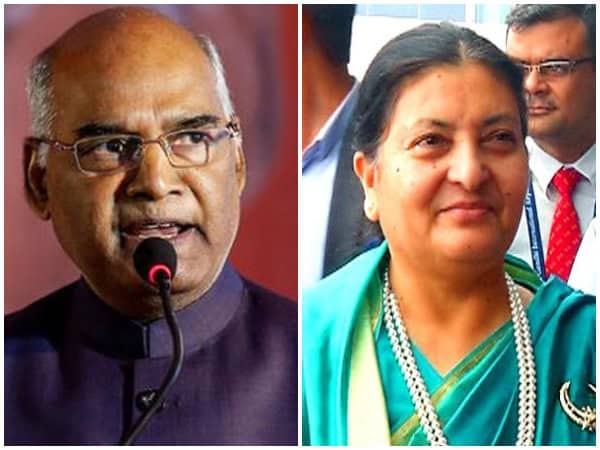Kathmandu : President Ram Nath Kovind has congratulated his Nepali counterpart Bidhya Devi Bhandari on her victory in the just-concluded Nepal presidential election and pledged for further building of bilateral ties in various fields.
The Indian Embassy in Kathmandu wrote on their official Twitter handle, “Hon’ble President of India Shri Ram Nath Kovind congratulates Rt. Hon’ble President Ms Bidya Devi Bhandari on her election as President of Nepal. Commits to working together to further strengthen wide-ranging cooperative bilateral ties for the benefit of people of India & Nepal.”
In a letter, President Kovind wrote to President Bhandari that the former expressed confidence that Nepal will move forward on the path of prosperity and development under President Bhandari’s guidance.
President Bhandari was on Wednesday sworn in as Nepal’s President for the second time. She garnered over 74 percent of the votes to be re-elected, while her rival Nepali Congress’ Kumari Laxmi Rai hardly drew 25 percent of the votes.
According to the Election Commission of Nepal (ECP), President Bhandari of the Left Alliance garnered 39,275 votes and Rai secured 11,730 votes.
With this, President Bhandari became the first President of federal Nepal and also the first Nepali President to be re-elected.
As close neighbours, India and Nepal share a unique relationship of friendship and cooperation characterised by deeply rooted people-to-people contacts of kinship and culture. Both countries share close linguistic, marital and religious ties respectively.
Nepal was ravaged by a massive earthquake and continuous aftershocks in 2015, killing over 9,000 people and rendering thousands of people homeless. Therefore, India has granted Nepal an amount of USD 250 million for the post-earthquake reconstruction and will help in the construction of nearly 50,000 houses in the Himalayan nation.
Also, the two countries signed an agreement in 2014, where India will build a 900 MW hydropower plant in Nepal at a cost of USD 1 billion, to help the latter overcome the erratic power supply, which is a major problem there.
Despite the cordial relations between the two countries, political issues and border disputes have strained relations since late 2015.
Nepal promulgated its new constitution in 2015. However, the Madhesis, the Janajatis and the Tharus, which are smaller communities residing in the plains of Nepal were left out in the new constitution and were considered marginalised groups. India had requested Nepal to recognise the Madhesis in the constitution.
When Nepal failed to recognise the Madhesis and other groups, despite repeated requests, the Madhesis in particular, then blockaded the border points, fuelling months-old economic blockage. Nepal accused India of deliberately worsening the embargo by not allowing vehicles to pass from check-points where no protests were held.
K.P. Sharma Oli, the current Prime Minister of Nepal, had took a defiant stance against India’s position to amend Nepal’s constitution and signed trade and transit treaties with China to counter Indian dependence when he was at the helm in 2015. (ANI)

